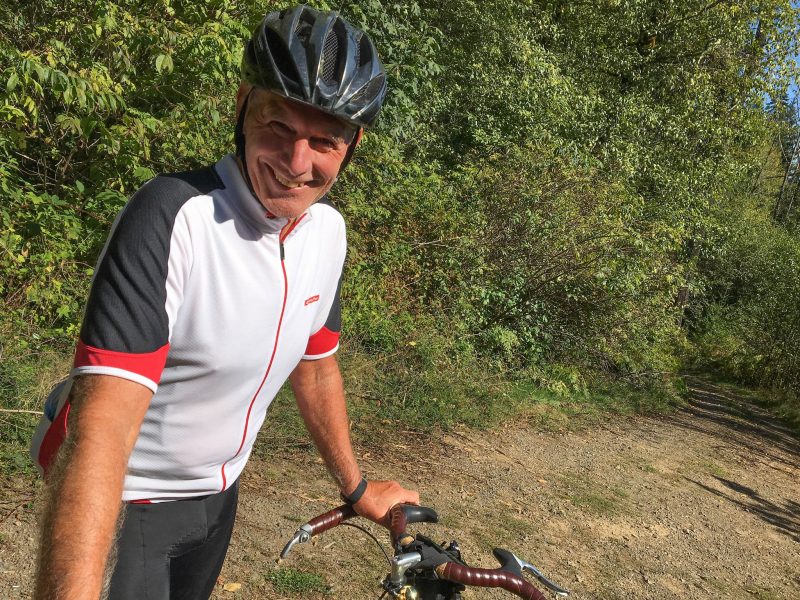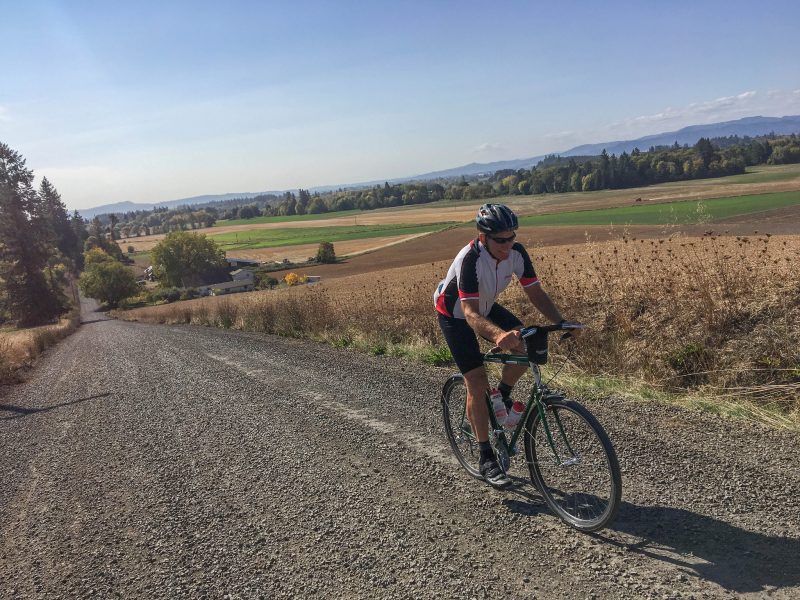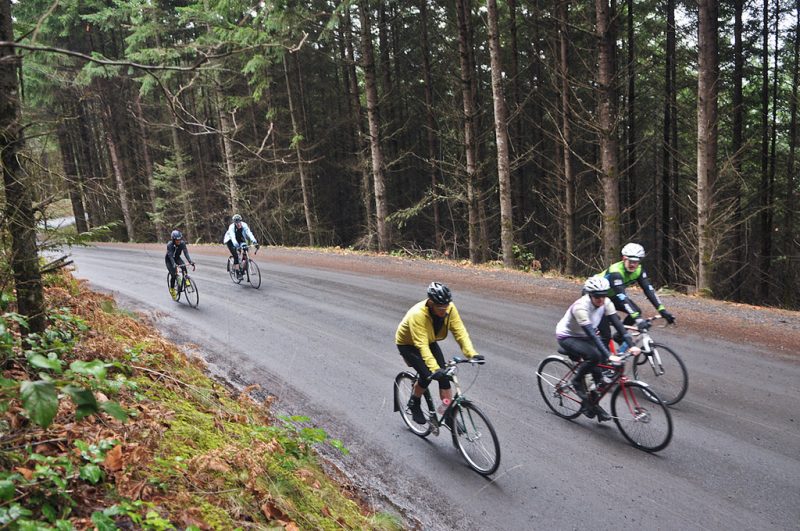
(Photo: J. Maus/BikePortland)
It’s fitting that I first met Dan Morgan on a gravel road.
The 66 year-old former dairy farmer, IBM retiree and Beaverton resident has been riding unpaved country roads his whole life. Now that the activity has become one of the biggest trends in cycling, he’s become an ambassador of sorts. He’s also working to prevent the county from paving over this newly discovered paradise.
“I’ve gotten my contemporaries to see that we respect and admire the same things that brought them to the rural area to begin with. They now understand what we do and why.”
— Dan Morgan
When we first met in 2013 he was helping Treo Bike Ranch owner Phil Carlson map out the roads of Morrow County in eastern Oregon. Since then I’ve come to appreciate Dan’s role in the community even more. He always seems to be helping someone out — whether they need a recommendation on tires (he’s an encyclopedia on the popular topic), want to know if a certain road is passable (his “secret weapon” to discover routes is a dual-sport motorcycle), or they need someone to sit on a committee.
Speaking of which, Dan is now the Chair of Washington County’s Rural Roads Operations and Maintenance Advisory Committee (RROMAC). As a transportation wonk, I loved discovering this committee. And as a lover of unpaved road riding, I was very happy to know Morgan was a part of it.
Committees have a bad reputation for being all process and no progress — but that’s not always the case. I wanted to know more about RROMAC, so I asked Dan to bring us up to speed.

How’d you get involved with this committee?
I believe that I caught a glimpse of a news article back in 2015 in the Washington County newsletter about the gravel road upgrade program and some of my favorite roads were on the list and high in priority. So I contacted the RROMAC/WashCo and they told me that the cycling community had agreed and if I had a different perspective I should come to one of the monthly meetings. So I did.
They have a few minutes on the agenda for public comments and when it was my turn I expressed my belief that paving these roads would reduce tourism and increase traffic and perhaps accidents as people will drive way too fast. You should have seen the expressions on their collective faces, they thought I was nuts. But I kept showing up month after month, trying to understand why there was so much pressure to pave. In 2016 I was approved as a RROMAC member, 2017 I was vice-chair, and this year I became the big kahuna.
What kind of issues have you and the committee worked on during your tenure?
Our charter is, “to study rural road operations and maintenance concerns in Washington County, work with County staff to develop program and funding alternatives and make recommendations to the Board of Commissioners.” So there is a format that we follow regarding project planning and execution within the rural boundary. RROMAC is made up of quarry, forest, agriculture interests, rural residents and me — the sole urban representative.
Issues can come up monthly from public input like: curb height on roundabouts that make it difficult for ag [agricultural] equipment to traverse, why roads have sidewalks on them in the middle of nowhere, prescriptive versus permissive rights, and the current condition of the road or shoulders for all vehicles and bicycles. There could be a concern raised regarding a county process impact on water rights, invasive species or the specifications for a project out for bid.

(Map from Washington County – full version here)
Is there a specific goal or vision RROMAC is trying to reach?
What I have set as goals for my chairmanship is to standardize the rating and the maintenance of our approx 220 miles of gravel roads. There are two projects that we are focused on currently, first is establishing a rating system for gravel road
conditions (there is one already adopted by the US for paved roads, known as PCI). This is only the second year of gravel road assessment and we have already found ways to improve the condition of the roads and reduce the costs.The second is related but a bit deeper into the process and policies of the county regarding “roads not maintained”. Roads like Parson, Pottratz, Hoffman and Shermans Mill are all valid four digit country roads that the county no longer maintains.
As you have experienced, it would be easy to assume that because of a landslide or other road disruption that there would be a process that the county follows to put a road in this category. Currently there is no formal process so RROMAC is developing one for the county to review and hopefully adopt. We have no idea whether the list of candidates will remain on the list or will fall back into the county’s road maintenance program.
I would like to implement a metric to measure our worth. Under consideration by RROMAC is the use of the average pavement condition index. We have been starved of funding but the new Vehicle Registration Fee increasing to $30 will help us maintain our rural road system better. So we should see the trend (lower left hand chart) go up for rural roads.
One goal that I haven’t really pushed much, but I see the seeds of it germinating, is that WashCo becomes the first county that has dedicated bike/hike/horse trails to each of its neighboring counties. We already have Multnomah and Columbia. But getting the Trees to Seas, Salmonberry, and Yamhelas Westsider trails complete would make me very happy.
Advertisement

In general, what is WashCo’s attitude toward the growing popularity of unpaved riding?
Their first reaction is that we are nuts. I share with them your posts, Dustin Klein’s videos and have even presented to them the economic value of cycling. I have gotten my contemporaries (it took some doing) to see that we respect and admire the same things that brought them to the rural area to begin with. They now understand what we do and why.
There are of course shared concerns. From the quarry/timber/agriculture/transportation perspective, they still view us as a safety hazard and very unaware how long it takes to slow or speed up something that weighs 20 or more tons. In their view we are not
very considerate when we ride. A good analogy that I was told since I ride for recreation and they drive to pay the bills (we won’t get into the whole who pays taxes thing). Anyway, how would we feel if a group of people decided that Frisbee or Disk Golf would be more challenging if it was played on N Williams during rush hour? Cyclist dodging disks while they were just trying to get home. To operators on these roads, this is what it feels like.Unfortunately WashCo is more focused on the potential growth as it becomes harder and harder to commute from Portland. The industry that is here and is forecasted to grow will put additional pressure on our rural areas, but all governments are driven by revenue and service to the majority of the population.
Is there a role for interested citizens to help support the work of RROMAC?
Subscribe to the receive weekly updates under the Land Use and Transportation section. It is full of information on which roads are closed and which roads are under construction. This is really important if you are scheduling weekly rides out here. Of course this is more paved road-centric. If there is a burning issue you can always always open a request or call 503-846-ROAD (846-7623).
If there is anything on the RROMAC agenda or minutes that concerns you, the public is always welcome to attend. Or you can bring it to my attention as the meetings are kinda early, but we have donuts.
Anything else you’d like to share?
Be a steward and dine or drink where you ride. It makes a huge statement to the community when you do.
RROMAC is responsible for about 50% of the land in Washington County but contains less than 10% of its residents. There are few funds available to this region and we try to support our base the best we can. We are not part of an urban area that has adequate funding so we do plenty with little.
And one last thing… Ride your bike and explore our rural roads!
Thanks for sharing Dan. And thanks for being on the committee. See you out there.
RROMAC usually meets on the second Thursday of each month at 7:30 a.m. Meetings are held at the Walnut Street Center, Training Room 1 (1400 SW Walnut St. in Hillsboro). Meetings are open to the public.
— Jonathan Maus: (503) 706-8804, @jonathan_maus on Twitter and jonathan@bikeportland.org
Never miss a story. Sign-up for the daily BP Headlines email.
BikePortland needs your support.

